Thomas AngeliniProfessor, Department of Mechanical and Aerospace Engineering, University of Florida Dr. Thomas E. Angelini is a professor in the Department of Mechanical and Aerospace Engineering at the University of Florida. His research background includes the study of protein, lipid, DNA and virus self-assembly; collective cell migration and force transmission in cell monolayers; bacterial biofilm growth and spreading associated with biosurfactants and extracellular polysaccharide. Currently, his work focuses on cell-assembly and collective motion in 2D and 3D cell populations, 3D bioprinting, and 3D printing soft matter. |
Yoshinobu BabaProfessor, Nagoya University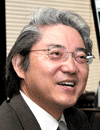 Dr. Yoshinobu Baba is Professor of Department of Applied Chemistry, Graduate School of Engineering, Nagoya University. He is also a Director of FIRST Research Center for Innovative Nanobiodevices, Nagoya University and a Director of Synchrotron Radiation Research Center, Nagoya University. He is an Associate Editor of Anal. Chem. of American Chemical Society and serving to over 20 scientific journals, including Nanoscale of Royal Society of Chemistry and Biomicrofluidics of American Institute of Physics, as an editorial/advisory board member. He is a co-initiator for the world largest Nanotech/Nanobio International Meeting and Exhibition in Japan and International Academy of Nanomedicine. He is a general chair of numerous international meetings (microTAS, MSB, NanoBioEXPO, ISMM). He has been admitted as a Fellow of the Royal Society of Chemistry and received over 113 awards for his contributions in nanobiotechnology: MERCK Award in 2004, award from the Applied Physics Society of Japan in 2006, and The CSJ (Chemical Society of Japan) award for creative work in 2008. His major area of interest is nanobiosicence and nanobiotechnology for omics, systems biology, medical diagnosis, tissue engineering, and molecular imaging. He is the author or co-author of 767 publications, including research papers, proceedings, reviews, and books and is also an inventor of over 70 patents. He has delivered more than 726 plenary and invited lectures at conferences. His work has been cited on 299 occasions by newspapers and televisions. |
Daniel CitterioProfessor, Keio University Daniel Citterio received his Doctoral degree in Natural Sciences from the Swiss Federal Institute of Technology (ETH) in Zurich (Switzerland) in 1998. From 1998-2002, he was a postdoctoral researcher at Keio University with Prof. Koji Suzuki. Upon return to Switzerland, he worked as a researcher at ETH, before joining Ciba Specialty Chemicals Inc.. In 2006, he moved back to Keio University, where he became a tenured Associate Professor in 2009 and Professor in 2014. In 2016, he has been admitted as a Fellow of the Royal Society of Chemistry (RSC). He serves as a co-Editor-in-Chief of the journal Sensors and Actuators B: Chemical, as well as on the Editorial Advisory Board of ACS Sensors. In 2022, he has been awarded the Chemical Society of Japan Award for Creative Work. His research is focusing on the development of chemical sensors and biosensors. More recently, his research team is strongly engaged in the development of microfluidic paper-based analytical devices (µPADs) for low-cost point-of-need applications. |
Dino Di CarloArmond and Elena Hairapetian Chair in Engineering and Medicine, Professor and Vice Chair of Bioengineering, University of California-Los Angeles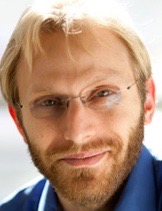 Dino Di Carlo received his B.S. in Bioengineering from the University of California, Berkeley in 2002 and received a Ph.D. in Bioengineering from the University of California, Berkeley and San Francisco in 2006. From 2006-2008 he conducted postdoctoral studies in the Center for Engineering in Medicine at Harvard Medical School. He has been on the faculty in the Department of Bioengineering at UCLA since 2008 and now as Professor of Bioengineering and Mechanical Engineering serves as the Vice Chair of the Department and as the director of the Cancer Nanotechnology Program in the Jonsson Comprehensive Cancer Center. His research pioneered the use of inertial fluid dynamic effects for the control, separation, and analysis of cells in microfluidic devices. His recent work extends into numerous other fields of biomedicine and biotechnology including directed evolution, cell analysis for rapid diagnostics, new amplified molecular assays, next generation biomaterials, and phenotypic drug screening. He has also been a leader in technology entrepreneurship: He co-founded and currently serves on the board of directors of five companies that are commercializing UCLA intellectual property developed in his lab (CytoVale, Vortex Biosciences, Tempo Therapeutics, Forcyte Biotechnologies and Ferrologix). Among other honors he received the Presidential Early Career Award for Scientists and Engineers (PECASE) and was elected a Fellow of the American Institute for Medical and Biological Engineering in 2016, was elected a Fellow of the Royal Society of Chemistry (FRSC) in 2014, was awarded the National Science Foundation (NSF) Faculty Early Career Development award and the U.S. Office of Naval Research (ONR) Young Investigator Award, the Packard Fellowship and Defense Advanced Research Projects Agency (DARPA) Young Faculty Award, and received the National Institutes of Health (NIH) Director’s New Innovator Award and Coulter Translational Research Award. |
Yanyi HuangProfessor, Peking University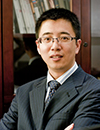 Professor Yanyi Huang is Professor of Analytical Chemistry at Peking University, and holds Principle Investigator positions in Biomedical Pioneering Innovation Center (BIOPIC), Peking-Tsinghua Center for Life Sciences at Peking University, and Institute for Cell Analysis at Shenzhen Bay Laboratory. He received his BS and ScD degrees from Peking University, and conducted his postdoc research at Caltech and Stanford University. He is Fellow of Royal Society of Chemistry. He is working on technology development for integrative biology researches, especially the new methods for genomic sequencing and large scale microfluidics. |
Chwee Teck LimNUS Society Chair Professor, Department of Biomedical Engineering, Institute for Health Innovation & Technology (iHealthtech), Mechanobiology Institute, National University of Singapore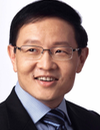 Professor Chwee Teck LIM is the NUS Society Chair Professor of Biomedical Engineering and Director of the Institute for Health Innovation and Technology at the National University of Singapore. His research interest is in the development of microfluidic technologies for applications in disease diagnosis and health monitoring. He has co-authored over 470 journal publications and is also a serial entrepreneur having started six companies. Prof Lim is an Elected Fellow of seven academies including the US National Academy of Inventors, IUPESM, AIMBE, IAMBE, AAET, among others. He and his team have garnered numerous research awards and honours including Asia’s Most Influential Scientist, Highly Cited Researcher, Asian Scientists 100, Wall Street Journal Asian Innovation Award (Gold) and the President's Technology Award among others. |
Noah MalmstadtProfessor, Mork Family Dept. of Chemical Engineering & Materials Science, University of Southern California Noah Malmstadt is Professor at the University of Southern California. He received a BS in Chemical Engineering from Caltech and a PhD in Bioengineering from the University of Washington. Following postdoctoral work at UCLA, he joined the Mork Family Department of Chemical Engineering and Materials Science at USC in 2007. Malmstadt is the recipient of a 2012 Office of Naval Research Young Investigator award. His research focuses on microfluidic strategies to facilitate material fabrication and biophysical analysis. He has pioneered the integration of ionic liquids as solvents in droplet microreactors and the application of microfluidic systems to synthesizing biomimetic cell membranes. Microfluidic analytical techniques he has developed include methods for measuring the permeability of cell membranes to druglike molecules and techniques for measuring ionic currents through membrane proteins. |
Amy ShenProfessor and Provost, Okinawa Institute of Science and Technology Graduate University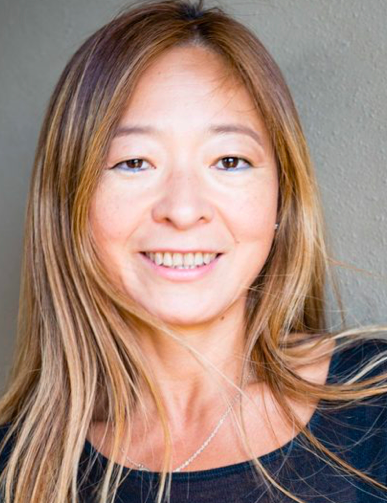 Amy Shen is the provost and professor at Okinawa Institute of Science and Technology Graduate University (OIST) in Japan, leading the Micro/Bio/Nanofluidics Unit. Amy's research is focused on microfluidics and lab-on-a-chip devices at the bio/nano-interface, with applications in biotechnology. She is a Fellow of the American Physical Society, the Royal Society of Chemistry, and Society of Rheology. Amy was also a Fulbright Scholar in 2013. She is an associate editor for Soft Matter and serves on the editorial advisory board for ACS Sensors, Journal of Rheology, and Physics of Fluids. |
Anderson ShumProfessor, Department of Mechanical Engineering; Director, Advanced Biomedical Instrumentation Centre, University of Hong Kong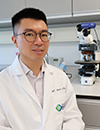 Ir Prof. Shum is widely recognized in emulsion, biomicrofluidics, biomedical engineering and soft matter; he receives the inaugural Hong Kong Engineering Science and Technology Award 2022, Croucher Senior Research Fellowship 2020, Rising Start Award by Ton Duc Thang University (Vietnam), NSFC Excellent Young Scientist Fund in 2019, Young Scientists Award in Microsystems and Nanoengineering Summit 2019, IEEE Nanomed New Innovator 2018, the Early Career Award by the Research Grants Council of Hong Kong in 2012. He became a fellow of Hong Kong Institution of Engineers in 2023, a member in the Global Young Academy (first from Hong Kong) in 2021, a founding member (in 2018) and President (in 2021) in the Young Academy of Sciences of Hong Kong and a fellow of the Royal Society of Chemistry (RSC) in 2017. He serves as an associate editor for Biomicrofluidics (American Institute of Physics), editorial board member for Microsystems and Nanoengineering (Springer Nature) and Scientific Reports (Springer Nature) and an editorial advisory board member for Lab-on-a-Chip (RSC). |
Lydia SohnAlmy C. Maynard and Agnes Offield Maynard Chair in Mechanical Engineering, University of California-Berkeley Lydia L. Sohn received her A.B. (Chemistry and Physics, 1988), M.S. (Physics, 1990), and Ph.D. (Physics, 1992) from Harvard University. She was an NSF/NATO postdoc at Delft University of Technology and a postdoc at AT&T Bell Laboratories (1993-1995). Sohn was an Assistant Professor of Physics at Princeton University prior to joining the Mechanical Engineering Dept. at UC Berkeley in 20013. Her work focuses on developing quantitative techniques to probe single cells. Sohn has received numerous awards including the NSF CAREER, Army of Research Young Investigator Award, DuPont Young Professor Award, and a Bakar Fellowship. In 2014, she was one of five winners in the “Identifying Platform Technologies for Advancing Life Sciences Research” competition for her work on Node-Pore Sensing. Most recently, she was elected a Fellow of the American Institute for Medical and Biological Engineering. |
Steve SoperFoundation Distinguished Professor, Director, Center of BioModular Multi-Scale System for Precision Medicine, The University of Kansas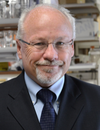 Prof. Soper is currently a Foundation Distinguished Professor in Chemistry and Mechanical Engineering at the University of Kansas, Lawrence. Prof. Soper also holds an appointment at Ulsan National Institute of Science and Technology in Ulsan, South Korea, where he is a World Class University Professor. He is also serving as a Science Advisor for a number of major worldwide companies. Prof. Soper is currently on the Editorial Board for Scientific Reports and Journal of Micro- and Nanosystems. |
Valérie TalyCNRS Research Director, Professor and Group leader Translational Research and Microfluidics, Université Paris Cité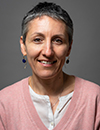 V. Taly is a CNRS research director and group leader of the Translational Research And Microfluidics team within the clinical oncology research unit MEPPOT (personalized medicine pharmacogenomics and therapeutic optimization) in the Cordeliers Research Center (university Paris Cité). Her team performs interdisciplinary researches aiming at developing and validating microfluidic tools for cancer research in close collaboration with clinicians and researchers in oncology and toxicology. Since 2008, she developed droplet-based digital procedures for Cancer diagnosis. Recently, her research has been dedicated to the clinical validation of droplet-based microfluidics for the non-invasive detection of Cancer biomarkers, the highlighting of new Cancer Biomarkers and the development of original tools and procedures for their detection with applications in personalized medicine, cancer recurrence detection and cancer diagnostics. She is co-founder of EMULSEO (2018) and METHYS DX (2021) start up companies. |
Victor UgazProfessor & Interim Department Head, Texas A&M University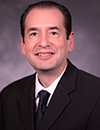 Victor M. Ugaz is a Professor and Interim Department Head in the Artie McFerrin Department of Chemical Engineering at Texas A&M University. He holds the title of Carolyn S. & Tommie E. Lohman '59 Professor in Engineering Education and serves as Chair of the interdisciplinary Master of Biotechnology (MBIOT) program. Dr. Ugaz’s research interests involve developing microfluidic systems to enable fast and inexpensive medical diagnostics and to understand the spontaneous organization of chemical building blocks essential to the origin of life. |




